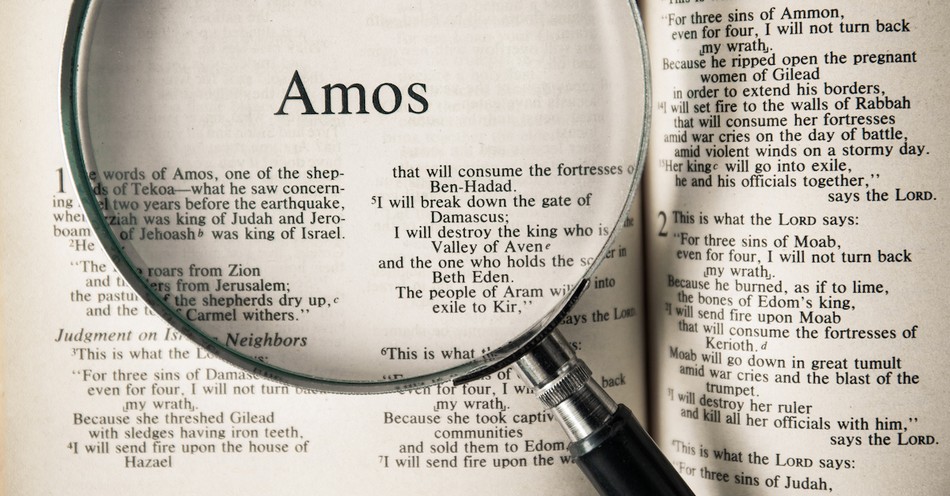Amos, originally a simple shepherd and farmer from the village of Tekoa, approximately five miles south of Bethlehem, unexpectedly became a prophet during the 8th century BC, specifically around 760 BC. His prophetic calling unfolded during the reigns of Jeroboam II in the northern kingdom of Israel and Uzziah in the southern kingdom of Judah (Amos 1:1). Amos’s contemporaries included other prophets such as Hosea, Joel, and Isaiah.
"The words of Amos, who was among the shepherds of Tekoa, which he saw concerning Israel in the days of Uzziah king of Judah and in the days of Jeroboam the son of Joash, king of Israel, two years before the earthquake." ~ Amos 1:1
Who is Amos in the Bible?
Amos was from Tekoa, a small town in Judah about 6 miles south of Bethlehem and 11 miles from Jerusalem. He was not a man of the court like Isaiah or a member of a priestly family like Jeremiah and Ezekiel. He earned his living from the flock and the sycamore-fig grove. Whether he owned the flocks and groves or only worked as a hired hand is not known.
His skill with words and the extensive range of his general knowledge of history and the world preclude his being an ignorant peasant. His home was in Judah, so he was sent to announce God's judgment on the northern kingdom (Israel). He likely mainly ministered at Bethel, Israel's main religious sanctuary, where the upper echelons of the northern kingdom worshiped.
Distinctively, Amos was not initially part of the prophetic community, as he stated, “I was neither a prophet nor the son of a prophet” (Amos 7:14), indicating he had no formal training or prophetic heritage. His call to prophecy was a direct act of divine selection. God chose him to deliver a particularly challenging message, not to his people in Judah but to the northern kingdom of Israel. This cross-regional prophesying was unusual, as prophets typically addressed their own nations.
Amos’s ministry was largely unwelcome in Israel. He faced opposition from the idolatrous priesthood, particularly from Amaziah, the priest of Bethel, who explicitly told him to leave Israel and return to Judah, saying, “Get out, you seer! Go back to the land of Judah. Earn your bread there and do your prophesying there” (Amos 7:12). Despite this resistance, Amos continued his mission in Israel, emphasizing the sins and forthcoming judgment of God upon the nation. His prophecies often began with a formulaic declaration of God's patience and impending justice: "This is what the Lord says: 'For three sins of Israel, even for four, I will not relent’” (Amos 2:6).
In his book, which Amos dates to "two years before the earthquake" (Amos 1:1), he uses simple yet powerful symbols like bird traps, fishhooks, plumb lines, and fruit baskets to illustrate his messages. These symbols helped make his complex messages more relatable and understandable to the everyday person.
While Amos’s personal life and details of his death are mostly unrecorded in the Bible, an apocryphal text, The Lives of the Prophets, suggests that he was killed by Amaziah. This hostile encounter is documented in Amos 7, where Amaziah accuses Amos of conspiracy against the king of Israel and orders him to leave Bethel. However, Amos remains steadfast, following God’s directive to continue prophesying in Israel, which includes delivering a personal prophecy of doom to Amaziah himself (Amos 7:17).
Amos's influence extends into the New Testament, where his words are quoted by Stephen in Acts 7:42-43 and by James in Acts 15:15-17. His message of seeking God, encapsulated in the directive “Seek me and live” (Amos 5:4), resonates through the ages, emphasizing repentance and God’s desire for redemption and forgiveness, themes reiterated throughout the Scriptures (Matthew 3:2; 2 Peter 3:9; Revelation 2:5, 21). This theme is further connected to the Christian message of salvation through Jesus Christ, as seen in New Testament references like 2 Corinthians 5:21 and 1 John 1:9, underscoring the timeless relevance of Amos's prophetic messages.
The Life of Amos
Amos was a herder and farmer from the Judean village of Tekoa, about five miles south of Bethlehem, who had a vision and became a prophet for the Lord. Amos prophesied during the reign of Jeroboam II in Israel and Uzziah in Judah. This would have been around 760 BC, making him a contemporary of Hosea, Joel, and Isaiah. Amos documented his prophecies in a book bearing his name. He dates his book of prophecy “two years before the earthquake.”
Amos was unique as a prophet for a couple of reasons. First, in his own words, he was “neither a prophet nor the son of a prophet” when the Lord called him into service (Amos 7:14). That is, he had not been trained as a prophet, nor was he seeking office. The Lord decided to grant Amos revelation. Also, primarily, prophets would proclaim their message to their own nation. Amos was called from the southern kingdom of Judah to declare God’s word in the northern kingdom of Israel. The idol-worshiping priest of Bethel told Amos, “Get out, you seer! Go back to the land of Judah. Earn your bread there and do your prophesying there” (Amos 7:12).
Although a simple shepherd and fruit picker, Amos foretold confidently that the nations needed to hear God’s message, not his. Amos 3:7 shows his belief that “surely the Sovereign LORD does nothing without revealing his plan to his servants, the prophets.” His book contains simple and practical metaphors like bird traps, fishhooks, plumb lines, and fruit baskets that help convey the meaning and importance of his prophecies.
The Book of Amos Summary
The dominant theme is stated in Amos 5:24, which calls for social justice as the indispensable expression of true piety. Amos was a vigorous spokesman for God's justice and righteousness, whereas Hosea emphasized God's love, grace, mercy, and forgiveness. Amos declared that God would judge his unfaithful, disobedient, covenant-breaking people. Despite the Lord's particular choice of Israel and his kindness to her during the exodus and conquest and in the days of David and Solomon, his people continually failed to honor and obey him. The shrines at Bethel and other places of worship were often paganized, and Israel had a worldly view of even the ritual that the Lord himself had prescribed. They thought the performance of the rites was all God required, and, with that done, they could do whatever they pleased -- an essentially pagan notion. They had no basis for standards of conduct without a commitment to God's law. Amos condemns all who make themselves powerful or wealthy at the expense of others. Those who had acquired two splendid houses (3:15), expensive furniture, and richly laden tables by cheating, perverting justice, and crushing the poor would lose everything they had.
God's imminent judgment on Israel would not be a mere punitive blow to warn but almost total destruction. The unthinkable was about to happen: Because they had not faithfully consecrated themselves to his lordship, God would uproot his chosen people at the hands of a pagan nation. Even so, if they would repent, there was hope that "the Lord God Almighty (would) have mercy on the remnant" (5:15; see 5:4-6,14). The Lord had a glorious future for his people beyond the impending judgment. The house of David would again rule over Israel -- even extend its rule over many nations -- and Israel would once more be secure in the promised land, feasting on wine and fruit (9:11-15). The God of Israel, the Lord of history, would not abandon his chosen people or plan of redemption.
The God for whom Amos speaks is God of more than merely Israel. He also uses one nation against another to carry out his purposes (6:14). He is the Great King who rules the whole universe (4:13; 5:8; 9:5-6). Because he is all-sovereign, the God of Israel holds the history and destiny of all peoples and the world in his hands. Israel must know not only that he is the Lord of her future but also that he is Lord over all and that he has purposes and concerns that reach far beyond her borders. Israel had a unique, but not exclusive, claim on God. She needed to remember his covenant commitments to her but also her covenant obligations to him.
Importance of Amos for Us Today
The prophecy of Amos carries an urgent message for the global church in the twenty-first century. Where God has brought material blessing to his people through honest hard work and diligence, such blessing should be received gratefully and enjoyed. Yet, in light of massive worldwide needs such as poverty, lack of clean water, malnutrition, and inadequate medical care, material blessings granted to some believers must go out to those parts of the world where help is needed. To do anything less is to tragically imitate the people in Amos’s day who neglected the poor among them. Such neglect deserves and will receive God’s judgment.
The church must never presume upon God’s favor. His justice is universal. He will deal in perfect justice with those who claim his love and compassion but fail to extend that love and compassion in concrete ways to others. As those who have been shown mercy, may we, as the church, love our neighbors near and far with the radical, self-giving love demonstrated in the gospel. “Be imitators of God, as beloved children. And walk in love, as Christ loved us and gave himself up for us” (Eph. 5:1-2).
Key Bible Verses from Amos
Amos 2:4
Thus says the Lord: “For three transgressions of Judah, and for four, I will not revoke the punishment, because they have rejected the law of the Lord, and have not kept his statutes, but their lies have led them astray, those after which their fathers walked.
Amos 3:7
“For the Lord God does nothing without revealing his secret to his servants the prophets.
Amos 5:4
This is what the LORD says to Israel: “Seek me and live;
Amos 5:8
He who made the Pleiades and Orion, and turns deep darkness into the morning and darkens the day into night, who calls for the waters of the sea and pours them out on the surface of the earth, the Lord is his name;
Amos 9:13-14
“The days are coming,” declares the LORD, “when the reaper will be overtaken by the plowman and the planter by the one treading grapes. New wine will drip from the mountains and flow from all the hills, and I will bring my people Israel back from exile. “They will rebuild the ruined cities and live in them. They will plant vineyards and drink their wine; they will make gardens and eat their fruit.
Sources:
Book of Amos Summary - BibleStudyTools.com
Who is Amos? - GotQuestions.com
Photo credit: ©GettyImages/aradaphotography
Christianity.com's editorial staff is a team of writers with a background in the Christian faith and writing experience. We work to create relevant, inspiring content for our audience and update timely articles as necessary.








